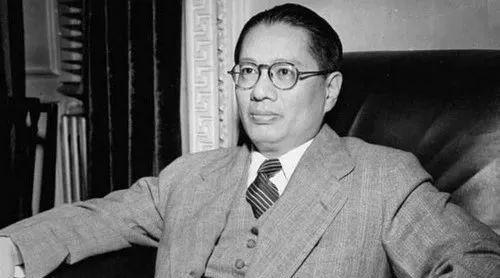In 1949, before Chiang Kai-shek retired to Taiwan, our party announced a list of war criminals, including Soong Ziwen, who had served as chief executive of the Kuomintang and a member of the National Government. This is because, in 1948, when Song Ziwen was concurrently serving as the director of the Guangzhou Appeasement Office and the supervisor of economic control in Guangdong, he adopted measures of "sorting out the police" and "strengthening military service", trying to turn southern China into a counter-revolutionary base, and declared: "The only choice for the Kuomintang is to continue to fight with the Communist Party whenever and whenever possible." But as early as 1936, the chairman wrote to Song Ziwen, in which he said that he had "great admiration for Song Ziwen!" "What's going on here?

It turned out that although Song Ziwen was a Kuomintang government official, his attitude toward Japan was very different from that of Chiang Kai-shek and others. Song Ziwen's anti-Japanese attitude was resolute and tough. The chairman admired Song Ziwen, and it was precisely this.
On January 28, 1932, the "128 Songhu War of Resistance" broke out. The next day, January 29, 38-year-old Song Ziwen was appointed vice president of the Executive Yuan and minister of finance. Song Ziwen repeatedly consulted with Shanghai financial and business people to raise urgently needed military funds for the Nineteenth Route Army, and coordinated with the Nineteenth Route Army to fight against the Japanese army. Show a positive anti-Japanese attitude.
In August 1932, Wang Jingwei resigned and went abroad, and Song Ziwen acted as chief executive, taking full responsibility for major matters such as foreign affairs and internal affairs. In response to the Northeast Customs incident orchestrated by the puppet Manchu authorities at that time to intercept the revenues from the customs duties and salt taxes in Northeast China, Song Ziwen issued several statements exposing the illegal nature of the puppet regime in Manchuria, pointing out: "The so-called 'Manchukuo' is a political system that has not yet gained a de facto existence, has no sovereignty over the management of territory, is only a political group like a cloud, and is all manipulated by plenipotentiary advisers. "It is advocated that the customs offices in the northeast be moved to the various ports in the customs. To a certain extent, this has safeguarded national sovereignty and dealt a blow to Japan's attempt to split China.
By 1933, Song Ziwen had made more fierce anti-Japanese remarks. In February of that year, Song Ziwen, acting president of the Executive Yuan, inspected Beiping, Rehe, and other places, saying that "our people will never abandon the northeast, our people will never give up Rehe, even if the enemy occupies our capital, no one will be willing to be an alliance under the city", "If the Japanese army attacks, it will use the strength of the whole country to negotiate with it." As for the salary, "Ziwen must plan to make contact, and the princes are at ease to kill the thief." During the inspection, he also repeatedly called on all localities and circles to "dispel prejudices, unite as one, and strive to resist Japan."
On March 17, 1933, Song Ziwen returned to China because of Wang Jingwei and announced that he would stop acting as chief executive. On the 18th, in his capacity as vice president of the Executive Yuan and minister of finance, he led a delegation to visit the United States, Britain, France, Germany, Italy, Belgium and Switzerland, and attended the Washington Economic Seminar initiated by US President Roosevelt and the World Economic Conference held in London.
During his visit to the United States, Song Ziwen and US President Franklin D. Roosevelt issued a joint statement, which expressed the uneasiness and dissatisfaction of the US Government with japan's armed invasion of China. During his visit to Europe, Song Ziwen exposed the truth of Japan's invasion of China to all countries, expressed China's attitude, and called on all countries to be vigilant against Japan's expansionist ambitions. Song Ziwen passed through Yokohama and Kobe twice during his visit, but Song Ziwen did not land on the shore, did not meet Japanese reporters, and refused to invite him to visit Japan.
It is precisely because of This series of anti-Japanese remarks and actions of Song Ziwen that he was praised by the chairman. At the end of 1935, at the behest of Chiang Kai-shek, Soong Tzu-wen and Soong Ching-ling discussed sending Dong Jianwu, an alumnus of St. John's University and pastor of St. Peter's Church in Shanghai, to northern Shaanxi to directly convey to the Central Committee of our Party the message that the Kuomintang was willing to negotiate.
On August 14, 1936, the chairman sent a letter to Song Ziwen: "Ten years apart, state affairs are all wrong, salvation is the only way to survive, only to return to the united front." The last time Dong Jianwu brother came, he expressed his contempt, but he did not know whether he had reached the left and right? Brothers and others have repeatedly appealed for the Nanjing authorities to change their external and internal policy, and although there are some clues at present, the big end remains unchanged, and it is very difficult to truly unite against Japan. Mr. Bang Guo heard of people, and sometimes there was a introduction to the anti-Japanese resistance, and he admired it very much! To take the initiative to reject traitors and traitors, to restore the revolutionary spirit of your party before Dr. Sun Yat-sen before 1927, and to implement the three major policies of the United Russia Communist Party of Agriculture and Workers, we will not only save the country, but also save ourselves. Kou is deeply troubled, his emotions are ringing, he is in the same boat in the wind and rain, and he is willing to hear the teachings. ”